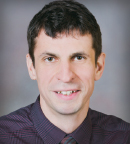According to Alexey V. Danilov, MD, PhD, Professor and Co-Director, Toni Stephenson Lymphoma Center, City of Hope, diffuse large B-cell lymphoma (DLBCL) refractory to chemotherapy represents an unmet medical need, with data from the SCHOLAR-1 study demonstrating a median overall survival of approximately 6 months.1
“Introduction of CAR [chimeric antigen receptor] T-cell therapy into clinical practice improved outcomes for these patients,” Dr. Danilov told The ASCO Post. “However, CAR T cells are associated with adverse events, including cytokine-release syndrome and immune effector cell–associated neurotoxicity syndrome as well as a nonrelapse mortality rate of up to 5%.”
“Moreover, more than half of CAR T-cell recipients relapse and may lack subsequent treatment options,” Dr. Danilov continued. “Epcoritamab demonstrated an impressive response rate (69%) in heavily pretreated patients with DLBCL, and 42% of patients achieved a complete response. Responses were similar in patients who experienced disease progression following CAR T-cell therapy.”

Alexey V. Danilov, MD, PhD
Dr. Danilov also noted the treatment was well tolerated, with just a handful of cases of high-grade cytokine-release syndrome (2.5%) and immune effector cell–associated neurotoxicity syndrome (one event).
“Thus, epcoritamab is a promising novel therapy with a distinct mechanism of action in DLBCL,” said Dr. Danilov, adding that it will be important to evaluate the durability of response. “Longer study follow-up is needed, but if durable responses are demonstrated, since bispecific antibodies are off-the-shelf drugs, one wonders whether they can be sequenced prior to CAR T-cell therapy in patients with DLBCL.”
“How CAR T-cell therapy will perform in patients who fail to respond to epcoritamab also needs to be investigated,” Dr. Danilov concluded.
DISCLOSURE: Dr. Danilov has served as a consultant to AstraZeneca, AbbVie, BeiGene, Genentech, Nurix, Morphosys, Incyte, TG Therapeutics, Bayer Oncology, and Pharmacyclics and has received research funding from AstraZeneca, Takeda Oncology, Bayer Oncology, SecuraBio, MEI, Nurix, Cyclacel, TG Therapeutics, and Bristol Myers Squibb.
REFERENCE
1. Crump M, Neelapu SS, Farooq U, et al: Outcomes in refractory diffuse large B-cell lymphoma: Results from the international SCHOLAR-1 study. Blood 130:1800-1808, 2017.

